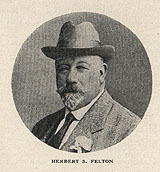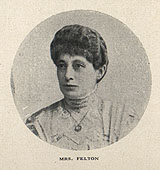| G. Felton | << = = | The Early Settlers of the Country Herbert S. Felton |
= = >> | Fernández |
 |
 |
This hardy pioneer of Patagonia came to these shores for the first time in the year 1886. Of a restless disposition, laborious and intelligent, with a clear vision of the future in these regions, undiscouraged by the merciless climate and the desolate surroundings, he set up his first estancia on the site of a small tent reinforced by pieces of tophus, some provisions and supplies, and 800 sheep from the Falklands brought over by the schooner "Rippling Wave".
Shortly afterwards, homesick for Port Stanley and those whom he had left behind overcame him irresistibly. He gave up his work for the time being, left his interests in the care of a hired man and went back to the island for his people, sold off his property, and took ship once more in the autumn of 1887 to settle down once for all. He reached Sandy Point with his wife and a little daughter a few months old, in a steamer of the "Cosmos" line, and as there was no other means of transportation than the horse, he purchased the needful number, provided a tent and supplies, and they started bravely over roads which did not exist, unconcerned about the difficulties to be overcome in order to reach the journey's end at "Chimen-Aike" where a friend of theirs had settled. The journey had started in the month of June with an icy temperature and with the land at its worst. Progress was slow and painful. The fifth day dawned with heavy snow, and the journey had to be kept up, for if not, they ran the risk of losing the way; for, as we have said roads there were none, and still less, fences to help to guide them. Imagine the sufferings of that heroic mother bearing her baby daughter in her arms amid the fury of the tempest.
After ten hour's travelling under these difficulties, the desired end was reached, and they fell into the arms of their friends from the Falklands — Captain Eberhardt and his wife, who kindly afforded them all that they might have need of. Mrs. Felton and her little daughter, worn out by the fatigue and suffering of the long journey, became ill and the child's life was in danger, but happily, the care and assiduous attention of the Eberhardt couple averted the danger, and in a few days mother and child had recovered. Reassured at last, Mr. Felton left his family with his friends, and set out for "Otern Aike" where he had obtained a piece of land (now belonging to Messrs. Clark Brothers).
There, with no other dwelling than a tent, he settled down to spend the rest of the winter, one of the severest in the memory of the oldest inhabitant of Patagonia, and together with a couple of labourers, he started to build a four-roomed house which he afterwards occupied with his family. He stayed there for three years and meanwhile, he as well as Mr. Eberhardt, obtained land on the North bank of the Gallegos river and in 1890.
Mr. Felton exchanged the land on the south bank for some which Mr. Eberhardt had on the north bank, moved his house and sheds, and started the formation of the estancia "Kilik-Aike-Norte" to which Mr. Felton devoted all his energies, and all the capital amassed in the long struggle for the triumph of his ideal at the price of constant sacrifice of every kind.
In the summer of 1895, when success was outlining itself, he had the misfortune of having his shearing-shed burnt with all the wool recently clipped, together with the materials intended for building his new house. But the fact did not affect Mr. Felton's fibre of tempered steel, he redoubled his activities all the more and at last won out.
In the year 1900, a great event filled the home with joy the birth of a son and heir. Charles Stanley Herbert — and the following year the building of the house now occupied by the family was begun.
It may be said without fear of contradiction that the establishment is one of the best in Patagonia; there is no flower or vegetable garden like it anywhere else. There are trees and shrubs from the United States, Australia, New Zealand, England, and Buenos Aires, growing hardy and luxuriant. In order to get them to grow, Mr. Felton's exceptional gifts and devotion to the task for years and years of incessant labour were brought into play and gave impetus to their growth.
Mr. Felton is a scion of one of the oldest families of the part of Great Britain called the Border, which divides England from Scotland. His father founded the town which bears his name, and, as captain of the regiment of "Life Guards", was sent to the Falkland Islands in command of the first English troops which landed in the Islands.
Mrs. Felton comes from Somersetshire (England), and if her husband's achievements were admirable, hers were not less so in leaving her comfortable home and burying herself with him in the wilds of Patagonia, often exposing her life, and bearing numberless privations, having to live on guanaco meat and dried beans.
Today, under the shade of the very trees planted by themselves, the Feltons — husband and wife — sleep the last sleep, bequeathing to friends and strangers the memory of their exemplary lives as an inspiration to many.
Source: «La Patagonia Argentina», pp.143-144